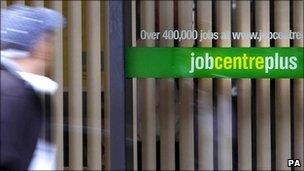Viewpoint: Spending review and the private sector
- Published

Construction firms have done well from government capital spending in recent years
Two of the key underpinnings of the steady economic growth of the past decade were ever increasing public spending and strong consumer consumption. But this has changed.
Consumer spending has been hit by the recession and the impact on house prices, and now we are facing a severe retrenchment in public sector spending which will remove one of the drivers of economic growth and may also further undermine, at least in the short term, consumer confidence.
So it is clear that the spending cuts in Wales, the scale of which will start to become clear after the Comprehensive Spending Review in October, are going to have meaningful economic consequences. But what shape will these take?
First, it will be a withdrawal of demand from the economy, but to a large extent this is being offset by the compensatory injection of money by the Bank of England - remember quantitative easing? The economists will argue strongly that the cuts are necessary to permit a continuation of the loose monetary policy that is already in place.
Next is the impact on individual companies. And there are a good number of businesses in Wales which pitch for government contracts.
A number of our defence companies are waiting to learn the impact of the CSR on defence budgets, and the priorities announced in the Strategic Defence Review.
Construction companies have done well from the high levels of government capital spend in recent years, though the reluctance of Wales to get involved in PFI has limited these opportunities.
Now though, at a time when private sector investment in property is restricted by bank finance availability, and underlying demand, and the housing market is hardly robust, the government tap is almost certain to be turned off.
Some companies are hopeful that the new imperative on government to drive efficiencies and find new ways of providing services that will offer a better quality/value combination (and shouldn't this have been a central driver for many years?) will create new business opportunities.
Introducing competition from different suppliers is a proven way of increasing quality and delivering savings, but to date in Wales the politics have prevented this. Will changing assembly finances result in a more welcoming embrace for the private sector?
And then there is the impact on the consumer. The experience of cuts in Ireland was that the waiting period ahead of the major announcements had a real impact on consumer confidence, but once the decisions had been announced the consumer recovered.
20 October, and the CSR, is a watershed date after which individuals will form their own judgement on their individual financial position and how they should respond.
Economically therefore there will be a mixed impact. The hope, and expectation, is that the macroeconomic benefits of returning the UK to a more sustainable fiscal situation will result in an overall higher level of growth than we would otherwise enjoy, and that is our best recipe for recovery.
'Clever country'
Socially, the impact is less certain. There will undoubtedly be an effect on public services and support, and much depends on the choices that are made by the UK government in October, the impact on the WAG budget as a consequence of Barnett funding, and how the Welsh government prioritises.
Will it choose to cut a little off each budget, or take tough decisions on services to be withdrawn?
How will it balance its preference for universalism, as demonstrated in policies such as free bus passes and swimming, with the aim of protecting the poorest?
Then there are other areas where we might expect public policy to be a priority.
The summer has seen a resumption of the debate about education spending in Wales, with the teaching unions ascribing lower overall exam results to a lower spend per pupil here.
At a UK level it is likely that the universities budgets will be hard hit, making this year's scramble for places the norm for coming cohorts of school leavers.

Benefit changes may be the most profound
What will be the effects of this on pupils who have been given the expectation that university is a natural progression into the workplace, and for social mobility?
It is clear that if Wales is to deliver on its ambition of being a clever country, and to increase the value of our economy, then we are going to need to continue to invest in education at all levels.
Finally, we have to consider the effects on the recipients of the largest component of government spending, the benefits system.
It is here that the changes are threatening to be the most profound, with radical steps being promised to move people from benefits to work. In some parts of Wales, for reasons well rehearsed, this has major implications.
If the coalition is successful in returning significant cohorts to work then this could transform the prospects of parts of Wales that years of economic development have failed.
But it is fraught with risk, and the withdrawal of a safety net from people of little use to employers, if that is how it proves, will have major consequences.
The support systems that need to be put in place alongside welfare reform are likely to be expensive, at a time when money is short.
It is too early to predict the net effect on Wales, but it is clear that life will be different. Now is the time for leadership, and tough and decisive action, from our governments both in London and Cardiff.
- Published16 June 2010
- Published17 June 2010